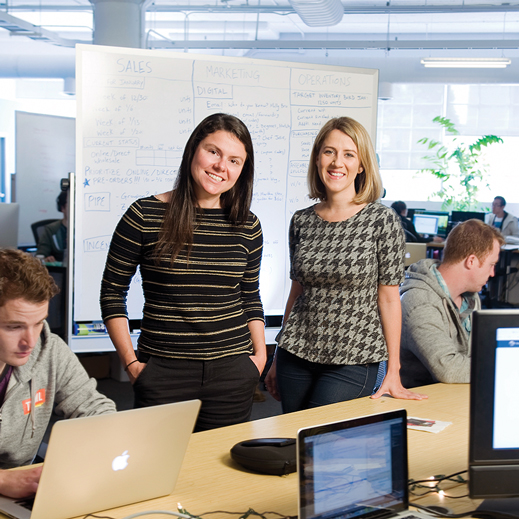Clara Brenner, MBA ’12, and Julie Lein, MBA ’12
On returning from summer internships to their second year at MIT Sloan, friends Clara Brenner and Julie Lein found they had both worked for startups that tackled urban problems—Brenner at Fundrise and Lein at Revolution Foods. And they had both loved the work.

After that, “we wanted to focus our studies on startups building products and services that solve community problems in cities,” says Brenner. They also saw a way to accomplish this in the example of a company that offers healthy meals in schools and stores. “Revolution Foods was run by a pair of women who had gone into business after going to business school together. It was a path that Clara and I would emulate,” Lein says.
Supported by Media Lab lecturer Joost Bonsen ’92, SM ’06, and Bill Aulet, SM ’94, managing director of the Martin Trust Center for Entrepreneurship, they soon worked with the Sloan Women in Management club conference, which they led, to focus on what they called “urban impact entrepreneurship.”
After graduation, Lein and Brenner moved to San Francisco and founded Tumml, which they describe as an urban impact accelerator. There, they began offering startups office space, funding, and mentoring. Some of Tumml’s first startups include Valor Water Analytics, whose software analyzes water utility data in cities; Handup, a mobile donation platform for the homeless; and Hitch, an on-demand ride-sharing company for commuters.
Tumml, named for the Yiddish term for “shaking things up,” hopes to encourage entrepreneurs to focus their attention on finding solutions to urban problems, says Brenner: “A real goal for Tumml is to make it just as appealing to start the next Handup as it is to start the next Twitter.”
In its first two years, Tumml has supported more than 50 entrepreneurs from 17 startups. The company awards $20,000 to startups in exchange for a 5 percent equity share. “We wanted to tie our success to the success of the entrepreneurs we support,” says Brenner.
Brenner, who grew up in Washington, D.C., attended NYU, and worked in commercial real estate before attending Sloan, was named to the 2014 Forbes 30 Under 30 list. She is also a member of the MIT Sloan Alumni Board and enjoys cooking and hiking. Lein, who grew up in Connecticut, attended Stanford, and worked as a polling consultant before Sloan, plays tennis and rock-climbs. Both confess, however, to spending much of their free time attending city and community meetings to network and learn.
Keep Reading
Most Popular
Large language models can do jaw-dropping things. But nobody knows exactly why.
And that's a problem. Figuring it out is one of the biggest scientific puzzles of our time and a crucial step towards controlling more powerful future models.
The problem with plug-in hybrids? Their drivers.
Plug-in hybrids are often sold as a transition to EVs, but new data from Europe shows we’re still underestimating the emissions they produce.
Google DeepMind’s new generative model makes Super Mario–like games from scratch
Genie learns how to control games by watching hours and hours of video. It could help train next-gen robots too.
How scientists traced a mysterious covid case back to six toilets
When wastewater surveillance turns into a hunt for a single infected individual, the ethics get tricky.
Stay connected
Get the latest updates from
MIT Technology Review
Discover special offers, top stories, upcoming events, and more.